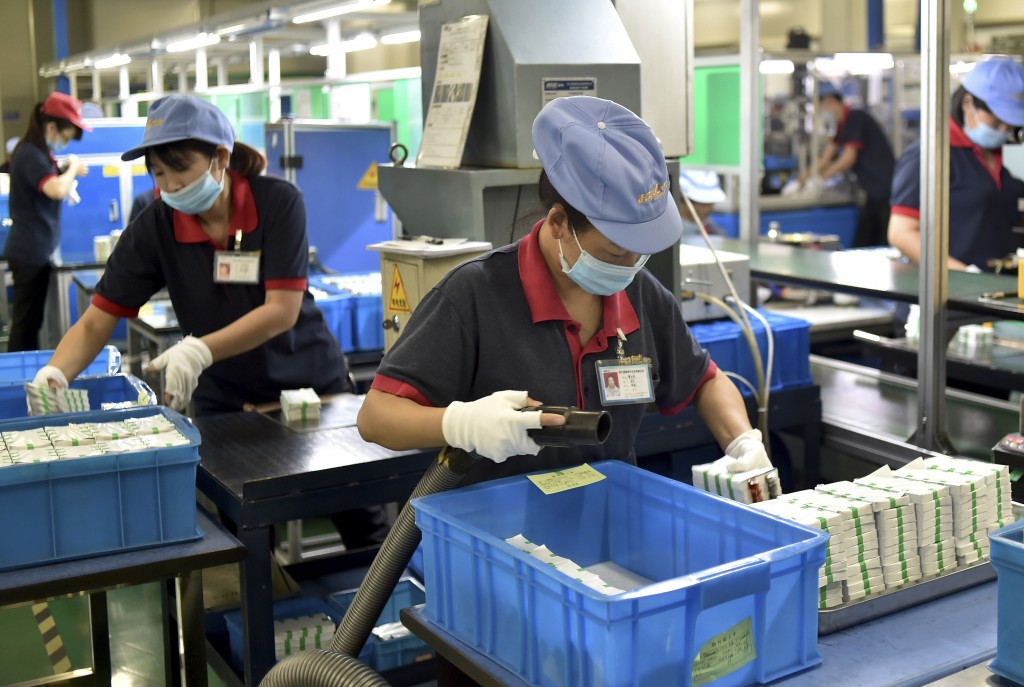China grapples with risk of economic hard landing

In this Tuesday, Sept. 1, 2015 photo, workers assemble lithium batteries at a factory of Chilwee Group, China’s leading battery maker, in Changxing county in east China’s Zhejiang province. Chinese Premier Li Keqiang tried Wednesday, Sept. 9 to mollify foreign concerns about its economic slowdown, saying growth is in the “proper range” and Beijing has no plans to allow its currency to decline further. (Chinatopix via AP)
SHANGHAI — When Chinese Premier Li Keqiang sought to reassure business leaders that the world’s second-largest economy can stave off a hard landing, he acknowledged mounting fears of exactly that, and analysts say the adjustment to slower growth will be painful.
Just six months ago, Li set a 2015 economic growth target of “around seven percent”, confidently telling lawmakers that the economy was adjusting to a “new normal”.
But he scrambled to reassure a World Economic Forum meeting on Thursday that China was not heading for a disorderly slump which would shake the global economy.
“If there are signs the economy is sliding out of the proper range we have adequate capability to deal with the situation,” he said. “The Chinese economy will not head for a hard landing.”
Still, gloomy perceptions of China are growing and the signs are troubling: a surprise currency devaluation, persistently weak manufacturing, and rising debt defaults, with a share price collapse to boot.
Article continues after this advertisementGovernment meddling in the stock and currency markets, including police investigations, as well as falling back on pump-priming to support the flagging economy, have raised questions over the leadership’s management and commitment to reforms, analysts say.
Article continues after this advertisementChina on Monday revised downward its 2014 economic growth figure to 7.3 percent, the weakest in 24 years. In both the first and second quarter this year, growth remained stuck at 7.0 percent, slower than last year.
“Nothing is working for Chinese leaders these days. They can slow the rate of descent, but they can’t change the downward direction of their economy,” Gordon Chang, an author and independent commentator on China, told AFP.
“At this moment, China’s technocrats look incompetent, clueless, and oblivious.”
The authorities’ next steps will be crucial, analysts say.
“The risk for a hard landing has always been there. Whether or not China will avoid it will depend on the policy reserves the government uses,” Zhang Jun, an economics professor at Shanghai’s Fudan University, told AFP, citing reducing local government and corporate debt as examples.
“There’s still space for the government to turn the situation around,” he said.
More action needed
Recent economic figures for August were a mixed bag, though showed glimmers of hope.
Exports performed better than expected, but imports plunged nearly 14 percent year-on-year.
Consumer price inflation ticked up to a manageable 2.0 percent, but the producer price index — a measure of costs for goods at the factory gate — fell 5.9 percent, the worst since September 2009.
The country’s biggest banks, including industry giant the Industrial and Commercial Bank of China, have reported rises in bad loans for the first half as companies struggle.
“Banks may become more cautious in lending to the real economy,” ANZ Banking Group economist Liu Ligang said in a research note on Thursday.
“This could turn into a vicious cycle of slower growth and deflation,” he warned. “Proactive policies are required to head off such a risk.”
China has already cut interest rates five times since November and the government this week offered some details of a more aggressive fiscal policy, including accelerating major construction projects.
China could deploy fiscal stimulus of at least 1.2 trillion yuan ($188 billion) over the next three years, according to an estimate by state-owned investment bank China International Capital Corp.
That would be far less than the 4.0 trillion yuan stimulus package China rolled out to stave off the effects of the 2008 global financial crisis.
But that sort of pump-priming was not without its costs — China is still paying the price from the crippling debt and asset bubbles that resulted.
‘Clumsy’ intervention
So perhaps, say some commentators, what is most needed is for the government to step back and not try too hard.
The very act of intervention itself goes against the principle of reform and the greater role the Communist Party has promised for market forces in the economy.
Authorities have spent an estimated $234 billion on buying shares to try to support prices after a nearly 40 percent collapse in the stock market since mid-June.
“The government’s efforts to prop up the (domestic) A-share market were clumsy, misguided and unnecessary. Hopefully, China’s leaders understand that now, and won’t repeat that mistake in the future,” Andy Rothman, investment strategist at Matthews Asia, said in a research report.
Despite the widespread global fears over the state of affairs in China, some of it is overdone, say analysts.
The chance of a hard landing is small, Citic Bank International’s chief economist Liao Qun told AFP, “even though China’s economy hasn’t fully stabilized and the picture is still uncertain”.
“The biggest risk for China now is its policy missteps, especially foreign exchange rate policy,” said Lu Zhengwei, chief economist at China’s Industrial Bank.
Authorities “should push through exchange rate reform and just allow the yuan to depreciate more”, he told AFP. “Government intervention should respect the logic of the market rather than work against it.”
RELATED STORIES
Tianjin blasts echo across China’s economy